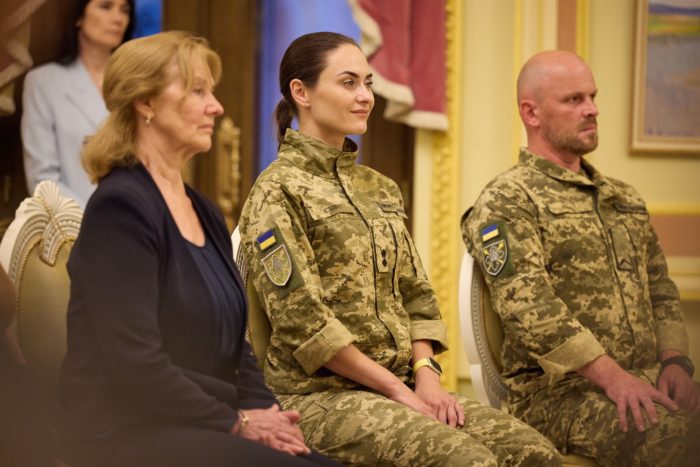Doctors Olha and Andriy Svyst were caught in Bucha when Russian forces advanced on Kyiv at the start of the invasion. They recount the horrors of war and how they managed to save their child patients from certain death.
Ukrainian doctors Olha and Andriy Svyst were recently invited by the President of Ukraine to receive the National Legend Award. The presidential award - National Legend of Ukraine - was established to honour citizens for outstanding personal achievements in the formation of an independent Ukraine, strengthening its statehood, protection of the Motherland and service to the Ukrainian people, for significant contributions to the development of the national economy, science, education, culture, art, sports, health, as well as for charitable and social activities.
In early March 2022, Olha, a pediatrician, and Andriy, a neurosurgeon, set out to the Bucha branch of the Irpin Municipal Hospital, where there was a shortage of surgeons, and for two weeks worked tirelessly day and night to rescue injured residents.
“This award is not only for us, it’s for each Ukrainian doctor, for all the medics and paramedics, for all the soldiers who cover the sky with their wings. We’re proud to be Ukrainian, medics of the Ukrainian Armed Forces. Our mission is to keep our people healthy and make sure that our soldiers return home to their families. Glory to Ukraine!” says Olha Svyst.
Under constant shelling, working in difficult conditions, Olha, Andriy and their colleagues provided medical care to wounded civilians and soldiers, and to children, who had suffered severe injuries, lost their parents or relatives. They also hid Ukrainian soldiers from the occupation forces in the hospital. They finally managed to escape from Bucha, which was surrounded by Russian forces, and helped place the wounded in different medical institutions in Kyiv.
Today, Olha and Andriy serve in the Armed Forces of Ukraine. Here is their story.
How it all started: the night of February 24
Olha remembers that she was not able to sleep on the night of February 24 because her daughter was very ill, running a high fever. At 4 a.m. she received a message from her colleagues in Dobrobut Clinic that Russian forces had invaded from the north. She woke her husband and they decided to evacuate their children to Olha’s parents in Khmelnytsky Oblast. As a precaution, they called their closest friends and asked them to adopt their children, aged five and two, should something happen to them.
When the children were safe with their grandparents, 47-year-old Andriy, a neurology specialist at the Romodanov Neurosurgery Institute in Kyiv, and his wife Olha, 35, decided to answer the call from Irpin Hospital in Bucha. They took no spare clothes or provisions, hoping to return in a day or two. Yet before leaving, the surgeon turned to his wife and said:
“We’re doctors and we know there will be many wounded, that all the doctors will be needed at their workplace. We remember what it was like in 2014…Do you understand that we’re going into hell?”
Soon after arriving, they realized they were trapped. As patients flooded into the hospital with terrible wounds from bombardments and battles raging outside, both Andriy and Olha realized that they would have to stay for more than one day; together, they vowed to treat and save their severely wounded child patients.
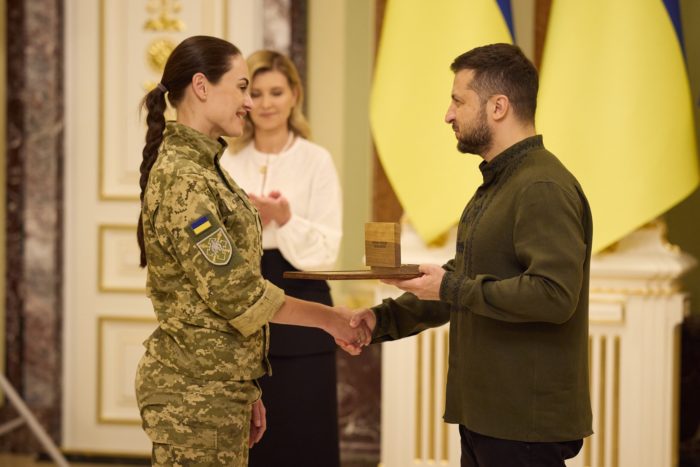
So, Olha performed triage (collecting patient information and prioritizing patient care), took care of hospital and pharmaceutical needs, interviewed and documented patients, while Andriy often performed complex brain surgery in a small, ill-equipped operating theatre.
“There were times we didn’t have running water, so we had to pour water from the kettle to wash our hands. There were power cuts. There was constant shelling… We could hear the sound of aircraft above the building; the artillery was always working.”
At times, we had to sleep on the floor of the operating theatre. Sometimes, we couldn’t fall asleep because of explosions nearby. It was like being on the front line. You finally fall sleep, but you don’t know if you’ll wake up,” recalls Andriy.
The first patients arrive
Andriy’s first patient was seven-year-old Katia. She arrived at the hospital on February 27, covered in blood, with shards of shrapnel driven deep into her head. The child’s family had been trying to escape the carnage that exploded around their home on the outskirts of Kyiv after the arrival of the Russian forces. Their car was targeted by the Russian artillery and only Katia and her father survived.
Her older brother and mother had succumbed to horrific wounds within minutes of reaching the hospital. After the operation, Katia was quickly evacuated to Italy, where she is undergoing rehabilitation and learning to smile.
“It was a very serious injury, a life-threatening injury. I was happy she survived. Operating on people while under constant shelling and without the proper medical equipment is just horrendous.” says Andriy Svyst.
The doctors are constantly in touch with all their former patients, those who either continue their treatment in Ukraine and others who are evacuated abroad.
Working in the most difficult conditions
Andriy worked with very few instruments, sometimes performing surgery under torch light in order to save fuel for the hospital generators. He contacted several colleagues who sent some surgical instruments. But there was no electricity for the CT scan, so he had to rely on X-rays and his own experience and skills.
“It was important to keep busy. Andriy operated while I drew up a cleaning schedule in the ward; we took turns washing the floor, the instruments, doing basic laundry, searching for food and medicine. I even worked out a kind of ‘hysteria schedule’ that helped limit negative emotions: today we are sad, tomorrow and the day after - we’re smiling. Our colleagues drew pluses and minuses on that chart and we could see who was calm and who was on the brink of a breakdown,” says Olha.
All the doctors worked round the clock. Only one of Andriy’s patients died: a man with a bullet lodged in his spinal cord, who took three days to reach the hospital. Andriy’s trickiest case was a rescue worker shot in nearby Hostomel, where Russian forces landed in a failed assault on the airport in the early hours of the invasion. He had a bullet wound in his arm and another buried in his head.
“The colleague who bought him to the hospital said the Russians were going around and shooting to kill all the wounded,” states Andriy.
After a five-hour operation, the rescue worker was evacuated to Dobrobut Hospital in Kyiv and then to Germany.
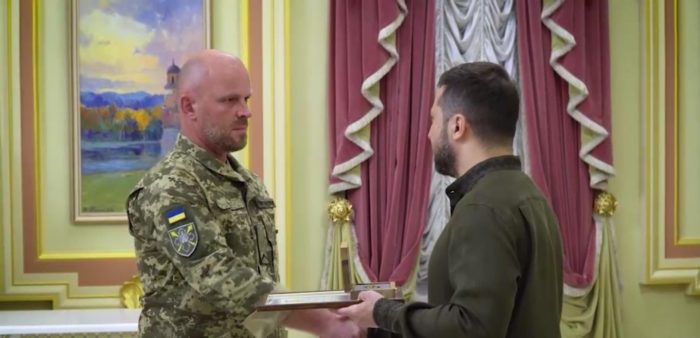
There were happy moments too. Babies were born in the hospital. Despite the whistling bullets and deadly missiles, such events brought tears of joy and smiles of hope and happiness.
Treating brave Sasha, civilians and soldiers
Civilians often spent several days trying to reach a doctor or any medical institution.
It took two sisters three days to arrive at the hospital after being stopped by Russians at checkpoints. One of the girls died along the way, but her sister Lida turned up with head wounds from five pieces of shrapnel. She survived.
Another patient, nine-year-old Sasha Filipchuk was shot in the arm when her family’s car was targeted as they tried to escape Hostomel.
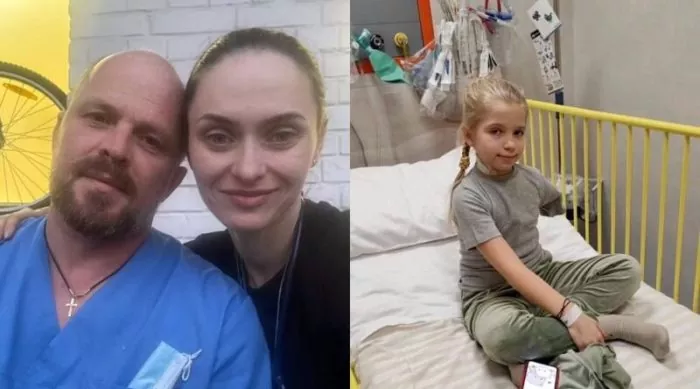
Her stepfather died, but Sasha spent two days hiding with her mother and sister in a basement, drifting in and out of consciousness, before a man carried her over two kilometres through fighting to the hospital.
“We rushed Sasha for surgery. I spoke with her mother saying maybe we wouldn’t be able to save Sasha’s arm. She replied in a calm quiet voice, ‘Just save my daughter’s life’. No tears, no panic,” said Olga.
After her left arm was amputated, Sasha’s photo appeared around the world, with her innocent quote:
“I don’t know why the Russians shot me. I hope it was an accident and they didn’t mean to hurt me.”
A crowdfunding campaign was organized for Sasha, and soon the little girl and her mother travelled to New York where Sasha was fitted with a high-tech prosthetic arm. The doctors even promised her that she would be able to move her fingers again.
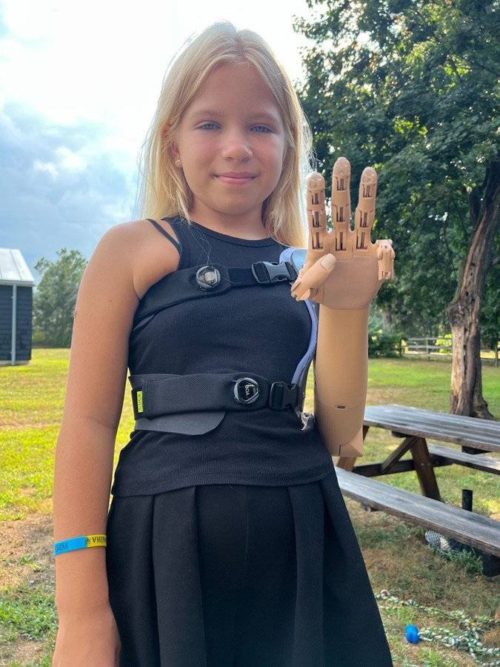
Working in occupied Bucha
Bucha was “officially occupied” on March 7, when the Russian flag was hoisted on the town hall. Olha was sitting in her tiny room, sorting medicine and equipment when she heard a rumbling noise in the courtyard. She ran to the window and saw a group of Russian soldiers jump out of a military vehicle and hurry towards the hospital.
She ran along the corridors, yelling at the top of her voice:
“The orcs are here! Hide! Quickly, hide!”
The rule was to hide as many people as possible so that there would be less provocation and fewer possible deaths. The Russians checked all the wards, searching for their own men and wounded Ukrainian service personnel. But, the hospital had acted very wisely - from the first days of the war, they registered Ukrainian soldiers under false names and dressed them in civilian clothes. Only one person was in charge of hiding the weapons; no one else knew where they were.
It became more complicated when the electricity and water supply were completely cut off. The shelling was endless. During air raid alerts, the medical personnel sat on the floor in the corridor. Some slept, some discussed the news, others tried to find a mobile signal to communicate with the outside world. Russian snipers were everywhere around the hospital, so it was dangerous to go outside.
“The medical staff lived in one ward and the patients lived next to us in another one. Once a young family arrived with a child, and we let them into the hospital. We entertained the kids, gave them toys and sweets. When children laugh, they cheer you up. But, at the same time, it was painful to see children with amputated arms or legs in wheelchairs, while others, healthy kids, were playing and running around the wards. It was impossible to look at such scenes without tears,” remembers Olha.
Olha remembers another moment when little girls who had undergone surgery needed to have their hair washed.
“The little girls that arrived with shrapnel in their head had dried blood and dirt in their hair so we would wash it with the little water that we had and later the mothers would braid their hair… We tried to make life as normal for the kids as possible.”
Evacuation. Olha and Andriy decide to leave Bucha with their child patients
On March 9, after lengthy negotiations with the occupations forces, the medical staff and the patients were allowed to leave the hospital.
Two buses arrived and Andriy, Olha and another doctor took Sasha Filipchuk and 18 other people to safety. The journey lasted almost seven hours, 20 kilometres through chaos and active hostilities. The seriously injured patients were placed carefully on the floor of the buses.
“We took everyone we could - wounded children and their parents, those who could sit and those who could not. The children were crying, they were afraid of the noise- the shelling and gunfire. We were also scared because we didn’t know if we’d be able to get them out alive.” says Andriy.
During the journey, Olha decided to record the names and data of all the persons travelling in the two buses – name, surname, place of residence, and phone number. She then texted the list to her colleagues in Kyiv so that they would know who was on the bus… in case something happened. These lists would also be useful to people searching for relatives and friends.
They finally reached a Ukrainian checkpoint, where the soldiers had a hard time believing that the doctors had escaped from Bucha given the intensity of the fighting. From there, the patients were transferred to several Kyiv hospitals. They were escorted by the police who wept openly when they heard that the children had escaped from the ill-famed town of Bucha.
The couple admits that the experience was terrifying, but they remained calm and impassive, turning their attention to their patients and ensuring their well-being. It is only when Russians soldiers are mentioned that Olha clenches her fists and says firmly:
“They aren’t human. This is not war. They are not soldiers… real soldiers don’t behave like that. They aim their guns at medics and ambulances; they kill civilians. The bodies of dead civilians are left lying on the streets, because the Russians don’t allow families or friends to bury them. We both feel a lot of hate. All of them should be put behind bars.”
When most of their child patients were stabilized, the doctors contacted the charitable organization ‘Mother and Infant’, which facilitated the evacuation of the children to Italy, as it was still very unstable in Kyiv. Andriy and Olha accompanied the kids to the border, where another team was waiting for them. Olha then created a ‘Bucha-Rome’ group so as to keep in touch with their child patients.
A few weeks later, Andriy and Olha Svyst were called up for military duty and now serve together in the Armed Forces of Ukraine.
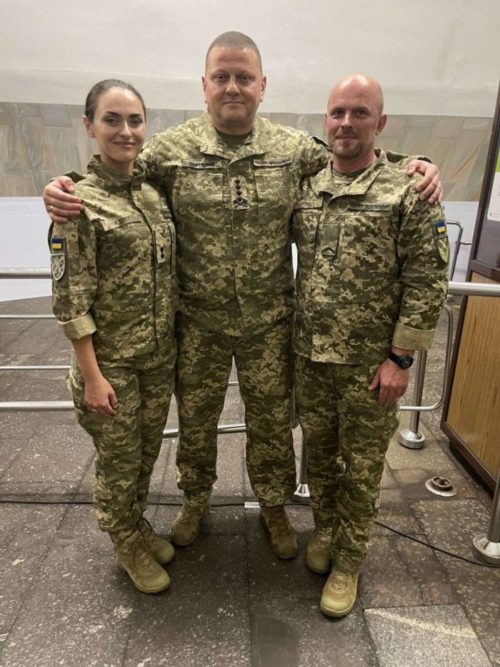
Looking forward to a bright future
Olha is optimistic about the future and underlines that all the children, who were evacuated abroad for treatment or rehabilitation, want to return home, to Ukraine. Of course, there will be many people suffering from trauma, many civilians and soldiers with amputated limbs, many widows and orphaned children, so all Ukrainian doctors will be tasked with an important mission - to provide the best care and treatment, the best prosthetic devices and the best rehabilitation.
“Our strongest, our most motivated and our most patriotic people are fighting in this war. They will return home. Therefore, in addition to providing them with the care and comfort they deserve, we must respect them and remember the price they paid for our freedom.” explains Olha.
The couple underline that we must never forget what is happening in this war. However, despite the physical wounds and psychological scars, Ukraine will grow and develop into a mature and full-fledged nation. Each Ukrainian carries in his heart a story or an image of this brutal war.
“Every time I visit my native Irpin, intense grief and the smell of blood overcome me. I’ll never forget the bullet-ridden car with a baby carriage beside it, the dead bodies in cars and lying on the roads.
Despite all the horror and tension, these two weeks in Bucha were the best moments of our family life, no matter how strange it may sound. We understood each other without words; we hugged each other every night; we went to bed knowing that there might be no morning.”
Read more:
- Snyder: Ten reasons Ukraine should win the war
- Russian attack on Ovruch: greenhouses bombed, death, devastation, and ruins all around.
- Russia’s war crimes in Chernihiv Oblast: “They were beaten, tortured & executed…”
- Russian war crimes in Katiuzhanka: torture chamber, toilets in classrooms, and stolen lingerie
- “At first, I did not want to live.” Ukrainian nurse got married after Russian mine took her legs
- Fallen pilots who saved the Ukrainian Air Force
- Cruelty, murder, and destruction in Bucha

